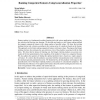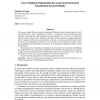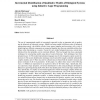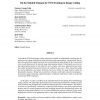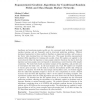108
click to vote
JMLR
2008
15 years 23 days ago
2008
Feature ranking is a fundamental machine learning task with various applications, including feature selection and decision tree learning. We describe and analyze a new feature ran...
103
Voted
JMLR
2008
15 years 23 days ago
2008
We propose a highly efficient framework for penalized likelihood kernel methods applied to multiclass models with a large, structured set of classes. As opposed to many previous a...
109
click to vote
JMLR
2008
15 years 23 days ago
2008
Many complex control problems require sophisticated solutions that are not amenable to traditional controller design. Not only is it difficult to model real world systems, but oft...
128
click to vote
JMLR
2008
15 years 23 days ago
2008
The use of computational models is increasingly expected to play an important role in predicting the behaviour of biological systems. Models are being sought at different scales o...
129
Voted
JMLR
2008
15 years 23 days ago
2008
When monitoring spatial phenomena, which can often be modeled as Gaussian processes (GPs), choosing sensor locations is a fundamental task. There are several common strategies to ...
101
Voted
JMLR
2008
15 years 23 days ago
2008
Classifiers favoring sparse solutions, such as support vector machines, relevance vector machines, LASSO-regression based classifiers, etc., provide competitive methods for classi...
106
Voted
JMLR
2008
15 years 23 days ago
2008
Conventional SVM-based image coding methods are founded on independently restricting the distortion in every image coefficient at some particular image representation. Geometrical...
116
Voted
JMLR
2008
15 years 23 days ago
2008
In supervised learning, a training set consisting of labeled instances is used by a learning algorithm for generating a model (classifier) that is subsequently employed for decidi...
141
Voted
JMLR
2008
15 years 23 days ago
2008
Log-linear and maximum-margin models are two commonly-used methods in supervised machine learning, and are frequently used in structured prediction problems. Efficient learning of...
128
Voted
JMLR
2008
15 years 23 days ago
2008
Regularized kernel discriminant analysis (RKDA) performs linear discriminant analysis in the feature space via the kernel trick. Its performance depends on the selection of kernel...
